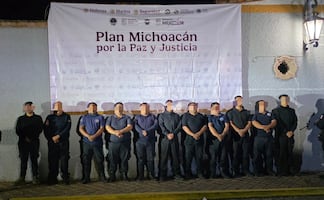Más Información

Sheinbaum encabeza ceremonia del Día de la Bandera en Campo Marte; llama a niños y jóvenes a honrar la Bandera

Sheinbaum: estrategia de seguridad no ha cambiado tras operativo contra “El Mencho”; “¡Dios nos libre!” de “calderonizarnos”, dice

"Caerán a tu lado mil, y diez mil a tu diestra; mas a ti no llegará"; el irónico Salmo bíblico hallado en el refugio de "El Mencho"

Detienen a director de la Policía Municipal de Ecuandureo, Michoacán y a 10 oficiales más; presuntamente estaban al servicio de “El Mencho”
In the Mexican town of Casablanca de Tacoaleche, Zacatecas , there are more empty houses than people to inhabit them. The eight families that live there tell how their town got emptier little by little, for people prefer to migrate to the U.S. than living in poverty.
The dusty streets, the closed stores, and an old school reflect the oblivion in which this town from Zacatecas was left in. The newest thing is a sports center recently built by authorities; however, it remains empty, for there is only a handful of children to use it.
In Tacoaleche, life is slower because there is not much to do. In the morning, buses from nearby factories pick up men and take them to work, while women stay at home to take care of their children, clean, iron, cook, and do other domestic labors.
The poor electricity, gas, and drinking water services make life tougher in this community, where families breed their own hens and pigs for food.
María Luisa Sánchez Díaz
, who is over 60 years of age, received EL UNIVERSAL at her home to tell the story of her community and that of one of her sons, who left for the U.S. 13 years ago and never came back.
“My son went there when he was 18 years old because there are no opportunities here. He left due to the need to help me, because I’m alone, because we have nothing ; we live from our work, but we are still poor . It’s been 13 years since I last saw him,” she expresses.
The only contact María Luisa can have with her son is through the telephone every 15 days; in addition, he sends her MXN $3,000 a month so that she can survive.
“Only [if] they kicked out my son [if he was deported] would I be able to see him, but why would he come here if there’s nothing ? In spite of that, since I really want to see him, when I call him I ask him to come back. After all, we won’t die of hunger , we have a lot of nopales,” says the woman.
She says that it was 40 years ago when the first persons started to leave Tacoaleche for the United States ; nevertheless, at that moment, people were not escaping poverty , they left, mainly, because it became a culture .
“ Children of 12 or 13 years of age were already thinking of leaving [for the United States]. They only waited for a group and left together. Some of these boys came back, but only for some time, for they would leave for that country again,” as explains María Luisa Sánchez.
She talks about the lack of opportunities in Tacoaleche when she talks about her other two sons who live with her: “They earn MXN $1,000 every week , and in addition, each of them has three children to feed; so the children are there, without shoes and with few clothes. They already began going to school, but they don’t even have a single notebook. Who knows what they’re going to do?”
Despite all these shortages , María Luisa’s love for her sons make her want to stay with them, and she asserts that some parents have passed away without seeing their migrant sons once more and hopes not to go through the same experience: “I only ask God that if my son is not to come back with me, to at least let me see him once more before I die, only that. I ask for nothing more.”
mp
Noticias según tus intereses
[Publicidad]
[Publicidad]
















